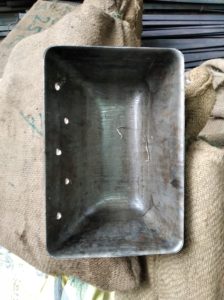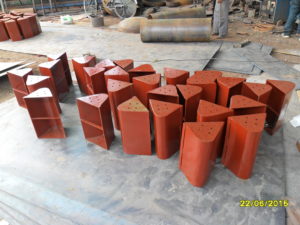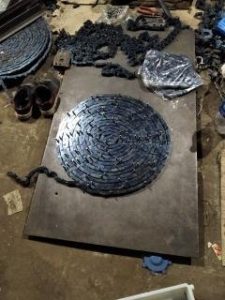ELEVATOR BUCKETS
Exact Bucket shape, Capacities and weight are not standard with various manufacturers. Buckets are usually of steel, Malleable Iron or Aluminium. There is possibility of plastic buckets being introduced by certain industries dealing in food products. Certain industries use stainless steel buckets
NON-METALLIC BUCKETS
Features
Non-metallic buckets reduce weight on elevator up to 80% while achieving up to 25% more capacity than cast iron buckets.
Non-metallic buckets are available with non-corrosive, non-sparking properties. Constructed with thicker walls and heavy front digging lip, various materials of construction offer heat, impact and abrasion resistance
Benefits
Extended bucket life decreases elevator downtime and maintenance costs associated with bucket replacement. Buckets are easy to install and replace with a variety of fastening options.
Lighter weight versus carbon steel buckets reduces energy usage. Non-metallic buckets offer a more cost effective alternative to carbon steel buckets.
Cleaner discharging buckets reduce material build-up in bottom of buckets to maximize product throughput.
METALLIC BUCKETS
Features
DI buckets are mill duty made with thick walls with reinforced back and corners. Available with non-corrosive, non-sparking properties.
DI buckets offer extremely high impact and abrasion resistance and can be used in applications with product temperatures up to 600°F. Buckets are designed to handle sand, glass cullet, stone, shot blast, rock, concrete and other abrasive products
Benefits
Long wearing digging edges, strong impact and abrasion resistance lead to extended bucket life decreasing elevator downtime and maintenance costs associated with bucket replacement.
DI buckets are designed with a smooth surface to ensure proper filling to maximize product throughput
DI buckets are stronger and more cost effective than welded steel buckets of the same gauge.
WELDED STEEL BUCKETS
Available Material of Construction
-
- M Steel
- Stainless Steel
- Aluminum
- Wear Lips
- Hardened Surface
- Hard Bead Weld
CHAINS
JMEP standard chain can be used for conveying and elevating .  These occupy little space and operate successfully under atmospheric and other conditions destructive to belts. As the design of the chain is to be taken against specific application. It is known. There are various types of chains. A few types of chains manufactured and supplied are illustrated In photographs given below.
These occupy little space and operate successfully under atmospheric and other conditions destructive to belts. As the design of the chain is to be taken against specific application. It is known. There are various types of chains. A few types of chains manufactured and supplied are illustrated In photographs given below.
STEEL ROLLER DRIVE CHAINS
JMEP Steel Roller Drive Chains are made in single , double and triple strands to meet power transmission requirements and are excellent for Chain Drives. A precision made steel bush roller chain operates on cut teeth sprocket wheels to give maximum efficiency . The side bars are punched from M.S Plate and steel rollers and machined . Forged steel pins are heated treated for hardness.
MALLEABLE CAST IRON CHAINS
These chains are suitable for operation on slat type conveyors and inclined elevators. Each link is made of 2 pieces which telescope, forming a non-binding bearing for the roller to turn on. Chains can be furnished with various types of attachments for fixing buckets etc
